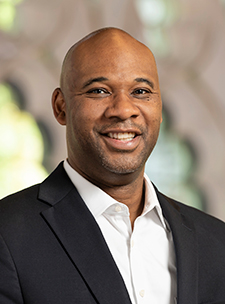Reflections from an Imperfect Art
Jazz, Health Justice, and the Moral Practice of Medicine
This event was held on the Harvard Medical School campus. A recording is available on our YouTube channel.
- Date: Thursday, February 8, 2024
- Reception: 4:00 - 5:00 p.m. EST
- Lecture and Q&A: 5:00 - 6:30 p.m. EST
About the Lecture
As a distinctively original African-American art form, jazz was born out of contexts marred by racial and gender oppression and economic exploitation. Many of the motifs of this genre of music can serve as guiding metaphors for the ethical life. This talk explored the relationship of jazz, understood as more than a music, to the moral practice of medicine for the promotion of health justice.

About Patrick T. Smith, PhD
Along with his work at the Divinity School, Smith is the director of the bioethics program for the Trent Center for Bioethics, Humanities, and History of Medicine and associate professor in population health sciences, Department of Health Sciences, Duke University Medical School. He has served as a member of the board of directors and the executive committee for the American Society of Bioethics and Humanities. His current research and writing are in the areas of moral philosophy, bioethics, theological ethics, end-of-life care, and religious social ethics. Professor Smith was named a 2016-17 Henry Luce III Fellow in Theology, was the recipient of the 2019 Paul Ramsey Award for Excellence in Bioethics, and in 2022 received the Edmund Pellegrino Medalist Award in health care ethics.
Professor Smith served as a lecturer at Harvard Medical School in the Department of Global Health and Social Medicine. He served as core faculty for the Master of Bioethics program offered through Harvard’s Center for Bioethics. He also was a principal faculty member for the Initiative on Health, Religion, and Spirituality, an interfaculty initiative across Harvard University that aims to be a research catalyst for an integrated model of spirituality, public health, and patient care in dialogue with spiritual communities. Professor Smith also worked professionally for eight years as the ethics coordinator for Angela Hospice Care Center in Livonia, Mich. During some of that time he served on the Ethics Advisory Council for the National Hospice and Palliative Care Organization and as a board member for the Hospice Palliative Care Association of Michigan.
He has served on the board of directors of organizations working for the common good and more equitable social arrangements such as YW Boston, which aims to empower women and eliminate racism. He also contributed thought leadership by serving on the board of a community development corporation that supports local communities through building affordable housing, engaging in advocacy work, and providing education on housing policies and practices.